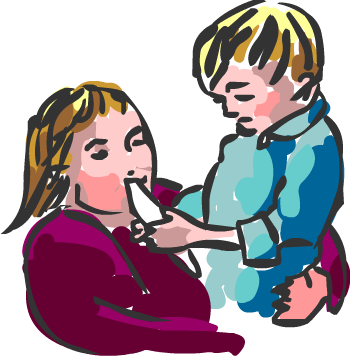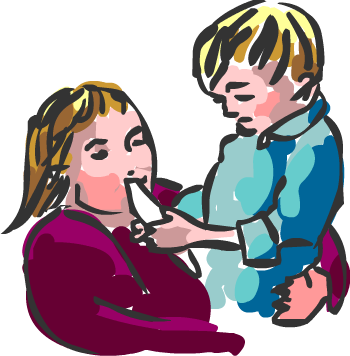Having a baby to save my child
In February 2010, the BBC aired a documentary called ‘Having a baby to save my child’ about the use of PGD to create saviour siblings. These are some quotes from the two families that took part in that documentary.
The first family
David and Samantha (parents), Ashleigh (teenage daughter) and little brother Alexander (18 months) who has Fanconi anemia. The family had a second daughter Jessica, who was diagnosed at nine years old with Fanconi anaemia and died when she was 11 years old. The family want to use PGD to make sure the next baby is a perfect match for Alex and able to donate stem cells from the umbilical cord at birth, which could save Alex’s life if he becomes seriously ill. PGD would also make sure that the new baby does not have Fanconi. The family cannot afford to fund the PGD, which costs £7000 a time, and have applied to the NHS to fund it for them. |
 |
Ashleigh “We (Jessica and I) shared everything with each other. There wasn’t anything we didn’t know about each other. Mum and Dad used to send us to bed or whatever, and we would sit for an hour, or two hours, and just talk about like, about anything that was bothering her or upsetting her or bothering her at school. Anything at all.
When Jessica was 11 years old and increasing ill, she had a bone marrow transplant from her dad, who was only a 50% match. A 50% tissue match bone marrow transplant has about a 65% chance of failing, and the person dying.
Ashleigh “We started to have a going home chat;. We looked at each other and thought, like fantastic this is really starting to go somewhere. Not long after that day happened, it really went downhill.”
Not long after that Jessica died.
Ashleigh “ Alex has exactly the same thing, its like I’m seeing a miniturete Jessica. You know? We are already starting with all the hospital appointments, blood tests...”
 “Part of me wants to just spend every second of every day with him in case the worse does happen, which it might. But then part of me, just wants to have nothing to do with him, completely keep my distance. So that I won’t miss him if he does go, and he won’t miss me, nothing like that. You just feel so helpless and out of control. You don’t know what to do.”
“Part of me wants to just spend every second of every day with him in case the worse does happen, which it might. But then part of me, just wants to have nothing to do with him, completely keep my distance. So that I won’t miss him if he does go, and he won’t miss me, nothing like that. You just feel so helpless and out of control. You don’t know what to do.”
“We’ve been let down so many times, and everything just going wrong and a part of me just doesn’t want anything to do with it. I could just run here, just camp out here. And do nothing, and let everyone else sort it out and I’ll come back when it is all better. “
“Life just seems like such a fight all the time. Sometimes I would just like a normal life. Like, you see all these people that complain about the littlest things. I would love to be able to do that. But I’m non-stop worrying about Alex, thinking if I don’t spend more time with him, I mean what’s going to happen, is he going to be there when I get home? Or is he going to be in hospital?”
“This baby could be his life-saver. They will be able to look at their brother every day and know ‘He is here because of me’. How would that child feel? You would feel so amazing wouldn’t you?”
Samantha (mum) “I will not let another child die, without a fight”
The family finally get news that the NHS will fund one round for PGD.
Ashleigh “You just like… Thank you!... you just like, it was amazing, just amazing. I can’t think, there are no words to describe it. All I can think now is that it works and that it will help Alex”
The second family
Alison and Tom (parents), son David (age 6) who has Fanconi anaemia and daughter Katie (18 months) who does not have Fanconi.
The family want to use PGD to make sure the next baby is a perfect match for David and able to donate stem cells from the umbilical cord, which could save David’s life if he becomes seriously ill. David is already mildly ill with a declining blood count and the family feel like time is running out to help him. PGD would also make sure that the new baby does not have Fanconi.
Tom “When you have a child with an inherited bone disorder like this, you have essentially been given a ticking clock. You lie in bed at night and you can almost hear the clock ticking.”
Tom “If I was a builder, I would build me son a house. If I was a plumber I would do his plumbing. Well I’m a doctor and I feel I have that responsibility towards him (and his health). We know David, we know who he is, we love him and we are going to save him.”
Alison and Tom are practising Catholics. (Many Catholics have concerns about embryo wastage that occurs in IVF and PGD).
Alison “I kind of feel that you should go on what you feel inside is right.”
Alison “It is very easy for people to judge us from the side-lines. Although we are desperate to help David, we are not grasping at straws. We haven’t come to this decision lightly, we’ve thought about it a great deal. But we’ve still come out the other end thinking this is the right thing to do.”
Tom “Alison and myself are Roman Catholic, but the way we look at it is. If there is a crisis, there doesn’t seem to be an issue (in the Catholic Church) about defending your country or defending your children or defending your life. And as far as we are concerned we are in a war situation, we are out to save our son from a desperate situation. And that means that our moral baseline is different to the rest of the normal population.”
Alison “We attend mass regularly at our local church and I guess there is probably a great deal of disapproval about embryo selection. I can only say I am doing what I morally feel for myself is right. It is all very well being really idealistic and saying ‘you can never do this, you can never do that, you must live a particular way.’ But why can’t we say that ‘God might be giving us a chance here’, and not ‘We are going against God’.”
Tom “We are not just having a child to save David’s life. I think any family who had been put into our situation, who have been told that their young child is in a life-threatening situation, they have an immediate desire to have another child.”
Tom “Parents of children who have very serious illnesses occupy a different position in life to other people. There is something very fundamental that eats the psyche of a parent when a child is unwell. You start to think differently from a lot of people around you. It is a parallel universe. You are in one dimension and everyone else is in a different dimension.”
Alison and Tom have been through four rounds of PGD and at the end of the documentary they are embarking on their fifth round.
Alison “You’d put you self through anything for your child, I think. If they needed a kidney, you’d give them a kidney. You would go through an operation, you would just get on with it… It is hard, but it what is going to be harder? The end result of losing a child is far harder than any IVF treatment that, is how I view it. I just think you would go through anything wouldn’t you... so I am. I'm just going through what is required.”
